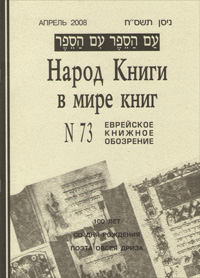The People of the Book in the World of Books is a Russian bimonthly publication for serious readers with Jewish interests. Our English website includes only the summaries of the published articles. To access the complete text of them, please visit the Russian version of this website.

|
||
|
This issue of the magazine includes:
• Names: Shike Driz (1908–1971)
The wonderful Soviet Yiddish poet Shike Driz was born 100 years ago in the shtetl of Krasnoe, not far from Vinnitsa. In 1922, he moved to Kiev, started to work at a factory, and very soon began to publish his poetry in the Yiddish magazines of that time. In the 1970s, Soviet literary critics regarded him as a folk poet who was very close to Yiddish folklore and to the realistic tradition of Sholem Aleichem. In reality, the only tradition that was close to Shike Driz from the very beginning of his literary activity was the tradition of Yiddish avant-garde. His first books, which were published in the 1930s, are full of experiments with language and poetic form. At the same time, he realized very clearly that the mask of a “folk poet” could be useful within realities of Soviet life, and often employed this mask. After World War II and the destruction of Soviet Yiddish culture in the “Black Years” of Stalin’s anti-Semitic repressions, Driz began to write fairy tales and poems for children. From the 1960s through the 1980s, he was one of the most popular and successful writers of poetry for children in the Soviet Union—his books in Russian translation were published over 50 times with extraordinary print runs. His poetry became the basis for several animated films, plays, and songs. Unfortunately, due to their mediocre translations, Driz’s poems for adults were not fully appreciated by mass audiences, even at the peak of his popularity. This article, dedicated to the 100th anniversary of Driz’s birth, analyzes his poetic heritage and concludes that the “real” Shike Driz still awaits discovery by Russian readers.
• Looking Through Russian Literary Magazines: Novels and Articles of Jewish Interest
• Publishers and Publishing Projects: History Workshop Minsk.
• Jewish Calendar of Significant Dates: May–June 2008
• Bibliography: 45 New Books |


